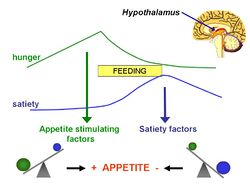Healthy obesity
Jump to navigation
Jump to search
What is Healthy Obesity?
For the course duration, the article is closed to outside editing. Of course you can always leave comments on the discussion page. The anticipated date of course completion is 01 April 2012. One month after that date at the latest, this notice shall be removed. Besides, many other Citizendium articles welcome your collaboration! |
Although obesity is a major risk factor for cardiovascular disease and type 2 diabetes mellitus, about a third of obese individuals maintain healthy cardiometabolic profiles; this phenotype of healthy obesity may be linked to the location of adipose tissue and the metabolic characteristics of the fat. Some data also suggest that weight loss by healthy obese subjects may have an adverse impact on their favorable cardiometabolic profile. [1] [2]
Why is Healthy Obesity Worthwhile investigating?
The Cause of Healthy Obesity?
Criticism of Current Data - Does the Healthy Obesity Phenotype Actually Exist?
References
- ↑ Lee CM et al. (2008) Indices of abdominal obesity are better discriminators of cardiovascular risk factors than BMI: a meta-analysis J Clin Epidemiol 61:646-53 PMID 18359190
- ↑ Wildman RP (2009) Healthy obesity Curr Opin Clin Nutr Metab Care 12:438-43 PMID 19474713
